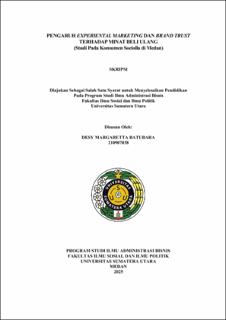| dc.description.abstract | This research is driven by the rapid growth of the beauty industry in Indonesia which is increasingly competitive, where experiential marketing and brand trust are key factors in maintaining customer loyalty. Sociolla, as one of the largest beauty retail platforms in Indonesia, is trying to increase its consumers' repurchase interest by offering an interesting shopping experience and building trust in the products they offer.
The purpose of this study is to analyze the effect of experiential marketing and brand trust on repurchase intention of Sociolla consumers in Medan City. The influence of the two variables will be analyzed both separately and simultaneously on repurchase interest.
The method used in this research is a survey with a quantitative approach, where data is collected through questionnaires distributed to 100 respondents who have shopped at Sociolla physical stores in Medan. The questionnaire consists of questions that measure experiential marketing, brand trust, and repurchase intention. The data obtained will be analyzed using multiple linear regression analysis to test the effect of each independent variable on the dependent variable.
The results showed that experiential marketing has a positive and significant effect on repurchase intention, with a tcount value of 4.166 which is greater than the t table and a significance level of 0.00 which is smaller than 0.05.
This shows that positive shopping experiences, such as an attractive store atmosphere, good service, and pleasant interactions with products, encourage
consumers to make repeat purchases. In addition, brand trust also shows a significant positive effect on repurchase intention, with a tcount value of 13.784 which is greater than 1.985 and a significance of 0.000. Simultaneous test (F test) shows that experiential marketing and brand trust together have a significant effect on repurchase intention, with an Fcount value that is much greater than Ftable. The Adjusted R Square value of 0.723 indicates that 72.3% of the variation in repurchase intention can be explained by these two variables, while 27.7% is influenced by other factors not examined in this study. | en_US |


